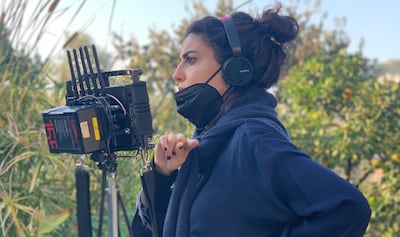This year’s Venice Film Festival has been announced, with a star-driven line-up of world premieres for several anticipated productions. Shows that will be screened at the event include Ridley Scott’s The Last Duel, Jane Campion’s Netflix drama The Power of the Dog and Denis Villeneuve’s sci-fi adaptation Dune, which was partly shot in Jordan and Abu Dhabi. But look further into the official selection and you'll find some impressive examples of Arab cinema, too.
In 2020, the festival premiered The Man Who Sold His Skin, which went on to become Tunisia’s first Oscar nominee, and Venice 2021 – the 78th event – could well be another launch pad for Mena filmmakers. Here are three Arab films to keep an eye on that are playing at the festival this year.
'Amira' by Mohamed Diab
Playing in the Horizons section is Mohamed Diab’s coming-of-age drama Amira. The film, which was shot in Jordan but is set in Palestine, wrapped in December 2019. It’s been held over during the pandemic, but this tale will undoubtedly stir up controversy when it's unveiled.
Co-written by the director with his siblings Khaled and Sherine Diab, the film deals with a real-life phenomenon about Palestinian children conceived via IVF using the smuggled sperm of Palestinian political prisoners languishing in Israeli jails. This true notion becomes the jumping-off point for a story about a girl named Amira (played by Jordan-born newcomer Tara Abboud) who believes she was conceived in exactly this way.
The film becomes a search for identity as Amira, 17, discovers that the man she believes is her father is in fact infertile. She then goes on a quest to discover her biological father and face up to who she is. The film stars Palestinian actors Ali Suliman (whose film 200 Metres played in last year’s Venice selection), and Ziad Bakri (The Translator), as well as US-Palestinian star Waleed Zuaiter (The Spy, Altered Carbon).
Egyptian director Diab is already highly celebrated for his earlier work and its stringent examination of political and social conditions. His 2010 debut, Cairo 678 (Les Femmes du bus 678), released a month before the Egyptian revolution, dealt with the plight of three women in Egypt facing sexual harassment. His 2013-set follow-up, Clash (2016), which played in the Un Certain Regard category at the Cannes Film Festival, all took place in the confines of a police truck as post-revolution tensions erupt.
'Costa Brava, Lebanon' by Mounia Akl
Bowing in the festival’s Horizons Extra strand is Costa Brava, Lebanon the directorial debut of Lebanese filmmaker Mounia Akl. This co-production (Lebanon, France, Spain, Sweden, Denmark, Norway, Qatar) excitingly pairs Palestinian actor Saleh Bakri (The Present) with Nadine Labaki. The Lebanese actress and director, whose 2018 film Capernaum was nominated for an Oscar, hasn’t appeared on screen in two years, since featuring in Oualid Mouaness’s film 1982.
Costa Brava, Lebanon is co-written by Akl and Spanish filmmaker Clara Roquet (El Adios) and has Bakri and Labaki playing a couple who leave Beirut in the hope of living a pollution-free life in the mountains. This utopian existence is destroyed, however, when the government decrees that a landfill be built right next to their new home, bringing the city’s rubbish right to their doorstep. Suddenly, the Badri family face being torn apart as tensions rise in their household.

As far back as December 2018, Costa Brava, Lebanon won a €50,000 ($59,000) grant when it participated in the TorinoFilmLab’s Feature Lab, which previously supported the work of Julia Ducournau (whose film Titane won the Palme d’Or at this year's Cannes Film Festival). Since then, anticipation has been growing for Akl’s first feature film to reach screens, after her impressive body of work in television.
On-screen, Akl, who divides her time between Lebanon and New York, is already famed for starring in the TV series Beirut, I Love You, which she co-created and co-directed. She has also helmed a number of shorts, including the 2016 effort Submarine, also set around Lebanon’s waste crisis. Co-written with Roquet, it was selected for the Cinefondation competition at the 69th Cannes Film Festival.
'Republic of Silence' by Diana El Jeiroudi
Receiving its premiere in the non-fiction segment of the out-of-competition strand is the documentary Republic of Silence, a co-production between Germany, France, Syria and Qatar. The director is Syrian filmmaker Diana El Jeiroudi, whose film promises to be a highly personal account of her childhood in Syria and, 40 years on, her exile in Berlin.
Expect a highly charged first-person account that is likely to pull no punches. As the synopsis so potently puts it, El Jeiroudi “grew up in the lands of dictators and surveillance, where images are censored, photos are burnt, thoughts are discreet, and mouths are kept shut”.
The film examines how the director “bore witness and became involved, how she revolted and claimed herself – and how cinema has saved her life”.
An English literature graduate, who worked in marketing and advertising before switching to documentary filmmaking, the Damascus-born El Jeiroudi founded the Dox Box International Documentary Film Festival in Syria. She’s already directed several shorts and documentaries, and she executive produced last year’s Venice entry Notturno, from Italian director Gianfranco Rosi, who previously won the festival’s Golden Lion for Sacro Gra.
Now it’s her turn to shine at this year’s Venice festival.

